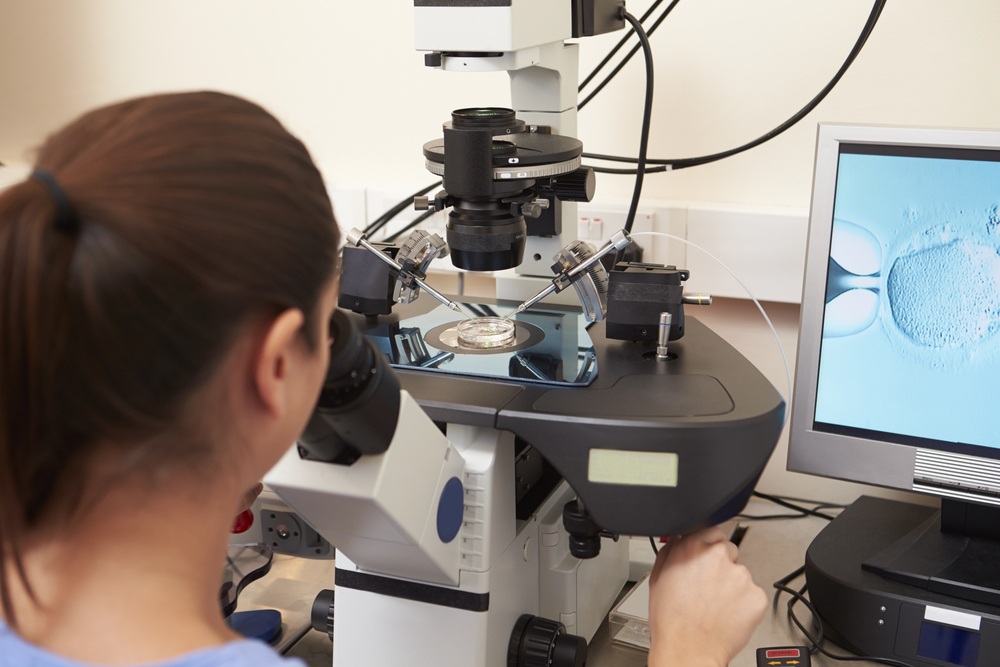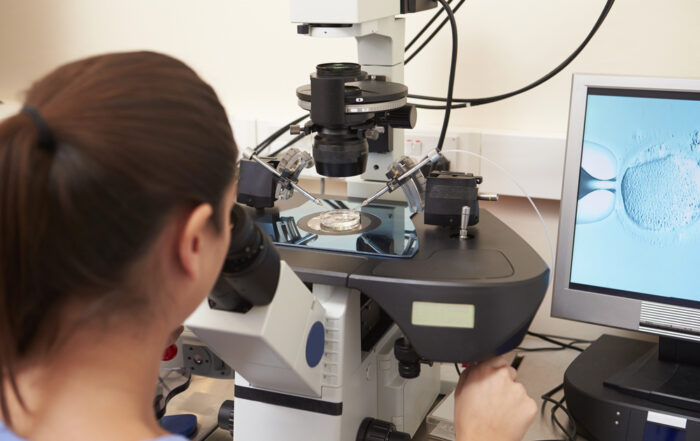
What is an IVF Cycle?
An In Vitro Fertilization (IVF) cycle is very similar to a regular menstrual cycle. In a menstrual cycle, several eggs mature and grow in your ovary then most are absorbed back into the body while one is released into your fallopian tube. In an IVF cycle, the eggs are retrieved at the point of maturation and are fertilized in the IVF lab to create embryos. After a meeting with your reproductive specialist, an embryo is transferred to the uterus to initiate pregnancy. The rest of the pregnancy progresses the same as an unassisted pregnancy.
The IVF Process Step by Step
Medication
The first few days of a menstrual cycle is considered a “baseline.” If all baseline parameters are met, this is considered the starting point of an IVF cycle. Rather than waiting for the on-set of your next period and starting then, the baseline state is often induced by a combination of medications which enables us to control the cycle more effectively.
Everyone who undergoes IVF will take at least one of the medications to help bring about the baseline stage and prevent you from ovulating on your own once the stimulation phase begins. In an IVF cycle, it is imperative that you do not ovulate for two reasons: First, if the eggs leave the ovary, the doctor will not be able to retrieve them. Second, if you do ovulate, there will likely be multiple eggs exposed to sperm in the fallopian tube, therefore putting you at risk for a high-order multiple-gestation if you have sexual intercourse.
Baseline Review
It is very important to have a proper baseline evaluation to check that:
- Neither ovary has any large cysts.
- Hormone levels of estrogen (e2), progesterone, LH are all low.
- Uterine lining is thin and ready to begin anew.
If there is a large cyst on the ovary, elevated hormone levels or a thickened endometrial lining, IVF treatment may be less successful and therefore should not begin.
Preparing For Egg Retrieval
Prior to egg retrieval, medications are injected into the ovaries to encourage the growth of multiple follicles on both ovaries over an average of 8 to 12 days.
During this time, our team of reproductive endocrinologists, nurses and sonographers will monitor your response to these medications by using transvaginal ultrasound images and hormone testing. Your physician evaluates the size and quantity of the follicles on your ovaries along with your hormone levels.
Once most of the follicles are in the mature range, your physician will decide when to discontinue stimulation drugs and plan the egg retrieval.
When your physician determines that it is time to schedule the egg retrieval, a trigger injection is ordered to start the final maturation of the eggs and you should ovulate within 36 hours. For this reason, we prescribe a precise time for you to take the trigger injection and we schedule your egg retrieval 35 hours later.
Egg Retrieval
During the egg retrieval you are placed under mild sedation while your doctor withdraws the fluid contents of each follicle, using an ultrasound-guided needle. The fluid is passed in a syringe to the embryologist, who then examines the liquid to see if an egg is present. By the time you leave the clinic that day you will know how many total eggs were retrieved.
The next day you will know how many of the mature eggs fertilized into embryos. In the days that follow we will monitor those embryos to see if they continue to divide and grow. It is important to remember that a follicle is not the same as an egg. When you are monitored during your IVF cycle, we use ultrasound technology to measure and count how many follicles are in the ovary; however, we cannot see the eggs inside.
Although we hope that each follicle contains an egg, we know that this is not the case. Not every follicle has an egg, not every egg is alive, not every live egg is mature, not every mature egg fertilizes and not every fertilized egg (embryo) continues to develop until the day of embryo transfer. Therefore, the more follicles you start with the better chance for overall success. Fortunately, it can just take one good embryo to make a baby.
Embryo Transfer
Typically, 5 days after egg retrieval, embryos are placed into the uterus in a procedure called embryo transfer. This procedure is not painful; therefore, patients typically are not sedated. The final decision regarding how many embryos to transfer and what to do with any remaining embryos is made on the day of transfer. The decision is made collaboratively among you, your doctor, and the embryologist.
Pregnancy
Fourteen days after egg retrieval, a blood test is performed to determine if a pregnancy resulted from this IVF cycle. If the test is positive, we will monitor your levels closely over the following days/weeks to confirm things are progressing as they should. Most patients are not symptomatic of pregnancy this early, so don’t be alarmed if you don’t “feel” pregnant, even if you’ve been pregnant before. Spotting (sometimes even heavy bleeding) can occur even if you are pregnant.
Once your pregnancy is confirmed you should proceed as your normally would with any traditional pregnancy.
If you are ready to start your IVF cycle with GIVF Fertility contact us today!





